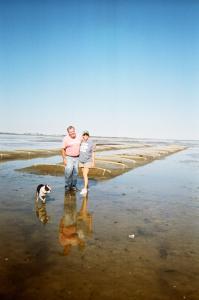Bob Bryson

Cape Cod Shellfish Industry Interviews
This is a collection of 15 interviews conducted in 2007 with people on Cape Cod who are involved in the shellfishing industry. Five people who are employed by towns to manage and regulate shellfish (Shellfish Officers), seven people who own shellfish aquaculture businesses (Growers), and four people who harvest wild shellfish commercially (Commercial Harvesters) were asked the question “What does shellfishing mean to you?”. From that starting point, questions centered on how the individual got into shellfishing and then what they thought the future of shellfishing might be.
The interviews were conducted by Sandy Macfarlane, a retired shellfish biologist and conservation administrator for the town of Orleans. The work was done under a contract with the Barnstable County Cooperative Extension Marine Program. Each interview is summarized into a written document that varies from 807 to 1557 words long and has an accompanying photograph. The interviews represent geographic, age, gender, and experience diversity as well as shellfish species diversity. All interviewees are year round residents of Cape Cod. One theme that emerged from this work is that shellfishing remains an important component of the Cape Cod economy and culture and those who are involved are concerned about its continued presence.
In 2007, Bob Bryson was a seasoned shellfish grower with deep roots in the coastal community of Barnstable Harbor, Cape Cod. His life and work are inextricably linked to the ebb and flow of the tides that shape the shores and livelihoods of those who call this place home. Born into a family with a rich legacy in shellfishing, Bryson has spent decades nurturing the beds that yield clams, oysters, and other bivalves, ensuring that the tradition of shellfishing is not only preserved but also thrives for future generations. Bryson's expertise is not merely technical; it is also steeped in the local culture and history of Cape Cod's shellfishing industry. His knowledge extends beyond the practical aspects of shellfish cultivation to encompass the environmental, economic, and social dimensions that influence this way of life. As a community member and a business owner, Bryson has witnessed firsthand the challenges and triumphs that come with managing a shellfish operation in an ever-changing landscape.
Scope and Content Note
The oral history interview with Bill Bryson provides a comprehensive overview of his experiences as a shellfish grower in Barnstable Harbor. He discusses transitioning from the wild fishery to aquaculture, quahaug disease, prices for clams, working as a dairy farmer in Vermont, housing development and lawn fertilizers and how they affect water quality, changes in Barnstable Harbor, family business, and working independently. The interview delves into various aspects of shellfishing, including the day-to-day operations of cultivation, the impact of diseases on shellfish populations, and the fluctuations in market prices that affect the economic viability of the industry. Bryson offers personal insights into the environmental changes he has observed over the years, discussing how shifts in water quality, climate, and coastal ecosystems have necessitated adaptations in shellfishing practices. He emphasizes the significance of shellfishing as a family enterprise, reflecting on how the business has fostered a sense of continuity and connection among his relatives. Throughout the interview, Bryson articulates his concerns about the future of shellfishing on Cape Cod. He addresses the potential threats posed by regulatory changes, environmental degradation, and the pressures of development. Despite these challenges, Bryson's narrative is imbued with resilient optimism, highlighting the enduring value of shellfishing as both a profession and a cultural touchstone within the community. The content of the interview is rich with anecdotes, technical knowledge, and philosophical musings, making it an invaluable resource for understanding the multifaceted nature of shellfishing on Cape Cod.
Please Note: The oral histories in this collection are protected by copyright and have been created for educational, research and personal use as described by the Fair Use Doctrine in the U.S. Copyright law. Please reach out Voices@noaa.gov to let us know how these interviews are being used in your research, project, exhibit, etc. The Voices staff can help provide other useful resources related to your inquiry.
The NOAA mission is to understand and predict changes in climate, weather, oceans, and coasts, to share that knowledge and information with others, and to conserve and manage coastal and marine ecosystems and resources. The Voices Oral History Archives offers public access to a wide range of accounts, including historical materials that are products of their particular times, and may contain offensive language or negative stereotypes.
Voices Oral History Archives does not verify the accuracy of materials submitted to us. The opinions expressed in the interviews are those of the interviewee only. The interviews here have been made available to the public only after the interviewer has confirmed that they have obtained consent.
